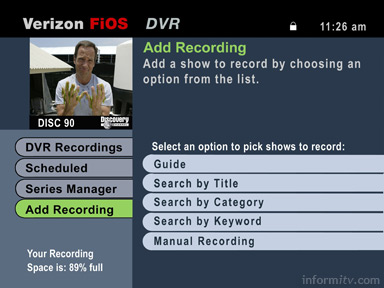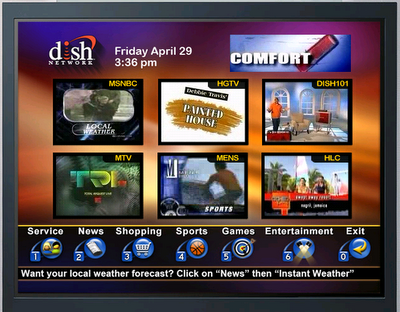Faster than a speeding bullet (the coming ubiquity of DVRs)...
 Source: [cut and paste the address into your address bar: http://informitv.com/ articles/2006/08/16/ verizonfiostv/index.shtml
Source: [cut and paste the address into your address bar: http://informitv.com/ articles/2006/08/16/ verizonfiostv/index.shtmlSooooooooooooooooooooooooooooo....you doubting Thomases that thought the best way to predict the future of the media was to look into the rear view mirror...here is a headline for you! "Verizon FiOS TV launches multi-room digital recorder." We've known this was coming from other providers than, say,DirecTV and Dish Network, but I have to say that my friends and family love to say "I don't need a DVR. I don't watch that much television." BINGO! Those folks will find the DVR even MORE valuable as they filter out the wheat from the chaff. I learned a great deal from my participant observer work at a major electronics retailer in the Christmas (yikes! I didn't say "holiday!") selling season in 2003. I was the one designated to answer any questions about TiVo. Needless to say, I was able to persuade them how valuable it was, but before taking that first bite, the skepticism was palatable.
The key to understanding the inevitable rise in the number of DVR households is the simple fact that it is becoming a commodity, and if you subscribe to cable or satellite, you're going to have a DVR. And, yes, I would predict the cost to the consumer will become "zero" sooner rather than later as the economies of scale in production kick in and the video provider can make money by downloading commercial content onto the DVR for later viewing (I just wrote about the attractiveness of automobile "infomercials" for those who are in the market for a new car).
You may use this content (better still, argue with me!), but please cite my ideas as © 2006, Dr. Bruce Klopfenstein. Find any typos! Don't smite me, let me know!
 Thanks blogger community for solving my mysterious error. I'll hang on to
Thanks blogger community for solving my mysterious error. I'll hang on to  cut and paste http://www.turnermediagroup.com/ itvcampaigns/banners/ into your browser's address bar...
cut and paste http://www.turnermediagroup.com/ itvcampaigns/banners/ into your browser's address bar...




